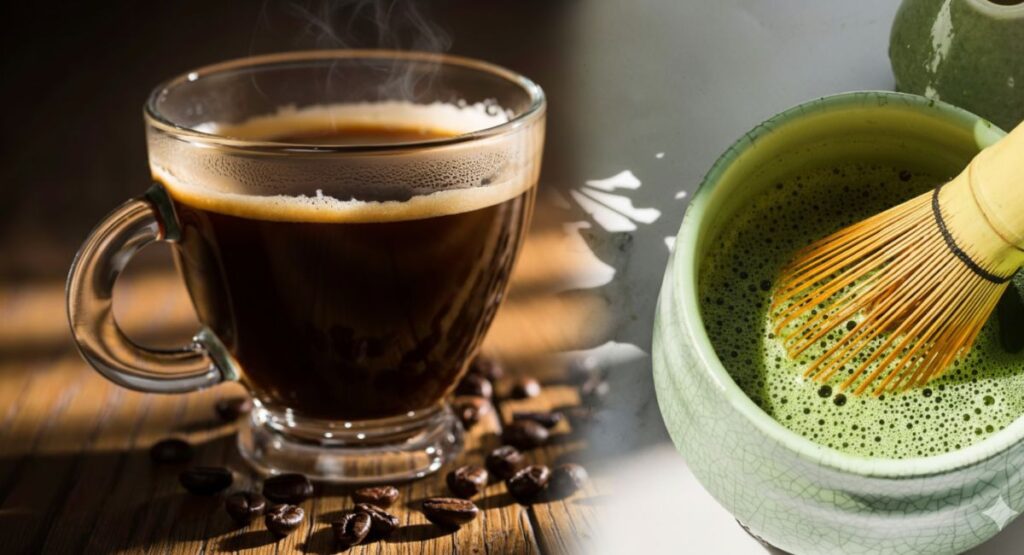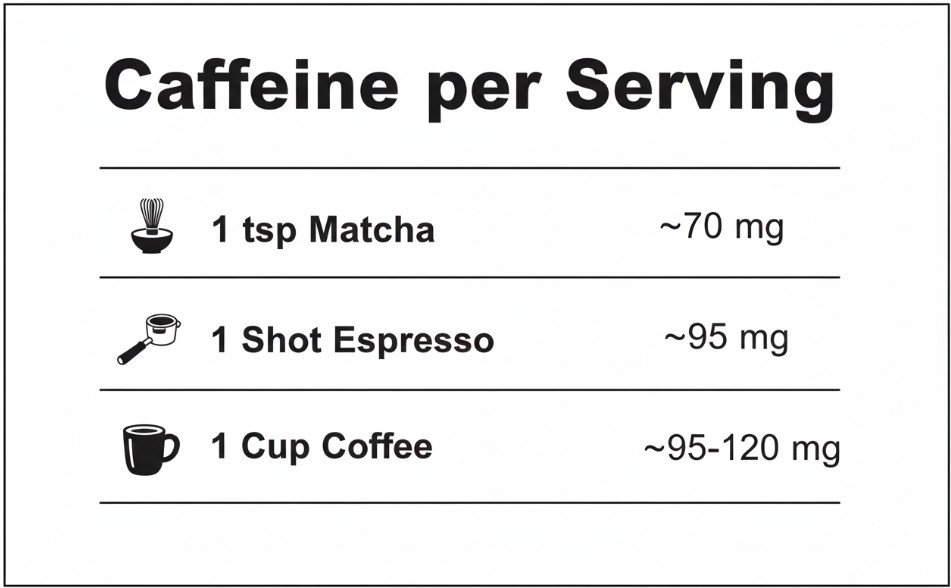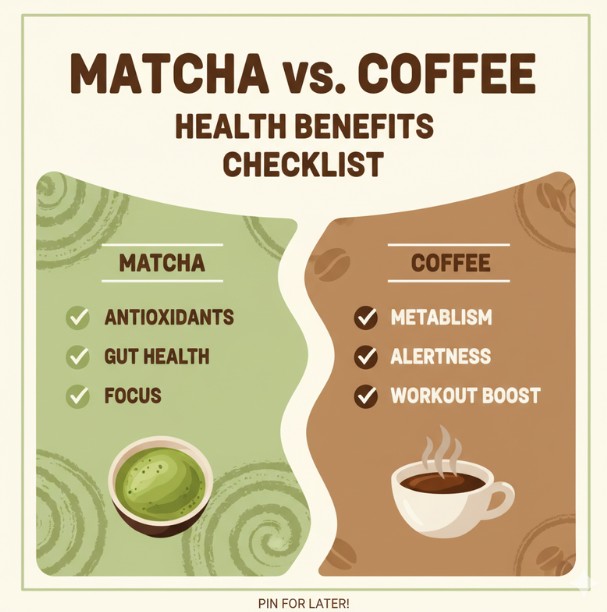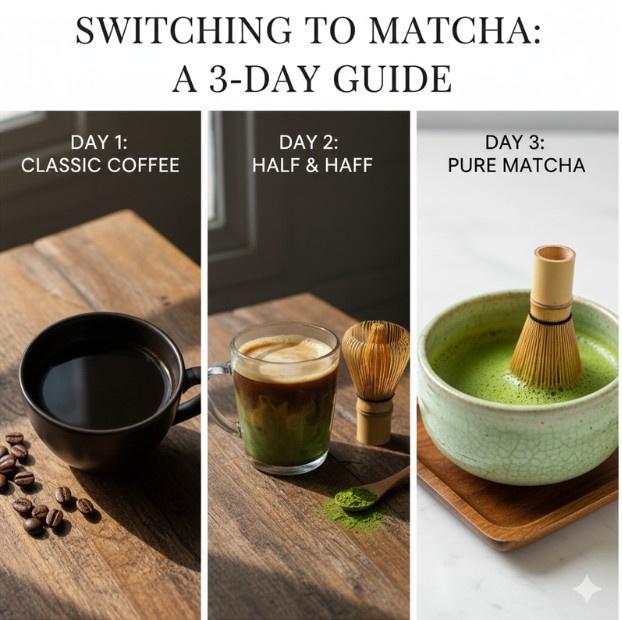
The Battle of the Morning Drinks
If you’re a coffee lover, you know the drill.
One sip of that strong cup, and suddenly you’re awake, alive… and sometimes a little jittery.
But here’s the thing: not everyone wants the crash that comes with coffee.
That’s where matcha—the vibrant green Japanese tea powder—steps into the spotlight.
So, how does matcha caffeine vs coffee really stack up?
Does matcha have more caffeine than coffee?
Is it healthier?
And most importantly, should you switch?
Let’s break it all down, matcha caffeine vs coffee, so you can make the choice that fits your lifestyle (and taste buds).
Matcha Caffeine vs Coffee: Quick Overview
Before comparing caffeine, let’s get the basics out of the way.
- Matcha is finely ground green tea powder. You whisk it into water or milk (instead of steeping leaves).
- Coffee is brewed from roasted beans. Strong, bold, and aromatic.
Flavor differences:
- Matcha = earthy, grassy, slightly sweet (especially if you buy ceremonial grade).
- Coffee = bitter, rich, sometimes nutty or chocolatey depending on the beans.
If you love experimenting with drinks at home, I recently shared a Matcha Coffee Latte Recipe that combines the two worlds. It’s called a dirty matcha latte—and yes, it’s as good as it sounds.
How Much Caffeine in Matcha vs Coffee?
Alright, time for the numbers.

- 1 teaspoon matcha (2 grams) = ~70 mg caffeine
- 1 shot espresso = ~95 mg caffeine
- 1 standard cup of coffee (8 oz) = ~95–120 mg caffeine depending on brew strength
So if you drink:
- A cup of coffee: ~100 mg
- A matcha latte: ~70 mg
- A dirty matcha latte (coffee + matcha): ~160–170 mg
That means matcha has less caffeine than coffee, but when combined with other compounds like L-theanine, its effect feels very different.
How Matcha and Coffee Affect Energy Differently
Here’s where things get interesting.
- Coffee:
- Hits your bloodstream fast.
- You feel alert within 15 minutes.
- But… you may also get jitters, anxiety, or the dreaded coffee crash.
- Hits your bloodstream fast.
- Matcha:
- Releases caffeine slowly thanks to L-theanine (an amino acid).
- Promotes calm focus instead of wired energy.
- Lasts longer—no spike, no crash.
- Releases caffeine slowly thanks to L-theanine (an amino acid).
That’s why many people switch: coffee jitters vs matcha calm energy.
If productivity is your goal, matcha can keep you steady for hours without the rollercoaster.
Health Benefits Compared: Matcha vs Coffee
Both drinks bring something valuable to the table.
Matcha Benefits

- Packed with antioxidants (catechins) that fight free radicals.
- Good for gut health and digestion.
- Boosts focus while reducing stress (thanks to L-theanine).
- May support weight loss by boosting metabolism.
Coffee Benefits
- Increases alertness and short-term memory.
- Associated with lower risk of certain diseases (like Parkinson’s and Type 2 Diabetes).
- Improves physical performance (hello, pre-workout coffee shot).
So which is better?
- For anxiety or focus: Matcha wins.
- For quick energy + workout fuel: Coffee wins.
- For antioxidants & long-term health perks: Matcha leads again.
👉 If you want to dive deeper, check out this Healthline guide on matcha.
Side Effects and Things to Watch Out For
Neither drink is perfect. Let’s be real.
- Too much coffee: jitters, insomnia, acid reflux, or that afternoon crash.
- Too much matcha: stomach upset (from tannins), possible insomnia if over-consumed.
If you’re switching from coffee to matcha:
- Start slow. Replace your second cup of coffee with matcha first.
- Avoid drinking matcha late at night—yes, it still has caffeine.
And remember: balance is key. Both drinks can fit into a healthy lifestyle.
What’s the Best Matcha Powder to Buy?
Not all matcha is created equal.
For lattes and daily drinking, go with ceremonial grade matcha. It’s smoother, less bitter, and brighter in color.
✅ A great starter option: Jade Leaf Organic Ceremonial Matcha (Amazon)
✅ Another favorite: Encha Ceremonial Matcha (organic, smooth flavor).
Quick tip: Avoid cheap culinary matcha for lattes—it’s better for baking.
And coffee fans? Bean quality matters too.
- Arabica = smoother, less bitter.
- Robusta = stronger, more caffeine, but harsher taste.
How to Switch from Coffee to Matcha Smoothly
Don’t quit cold turkey (trust me, caffeine withdrawal headaches are not fun).
Instead:
- Swap your afternoon coffee with matcha first.
- Try an iced matcha latte for a refreshing change.
- If you miss the bold coffee taste, try a dirty matcha latte (matcha + espresso together).
👉 For the recipe, check out my Matcha Coffee Latte Guide.
Is matcha in coffee good?
Yes, it’s actually delicious. Coffee provides a bold kick, while matcha balances it out with a calming energy.

FAQs Matcha Caffeine vs Coffee
Does matcha have more caffeine than coffee?
No. A cup of coffee has ~95–120 mg caffeine, while matcha has ~70 mg.
Is matcha better than coffee for focus?
Yes. Matcha’s L-theanine smooths out the caffeine effect, giving longer focus without jitters.
How long does matcha caffeine last?
Up to 4–6 hours, compared to coffee’s sharper 2–3 hour effect.
Can you mix matcha and coffee?
Absolutely—it’s called a dirty matcha latte. Balance is key so neither flavor overpowers.
What matcha powder should I buy?
Start with a ceremonial grade matcha. Jade Leaf Organic (Amazon) is budget-friendly and smooth.
Should You Switch to Matcha?
After explaining the whole concept of matcha caffeine vs coffee, Here’s the deal:
- Coffee is bold, instant, and energizing.
- Matcha is steady, calm, and antioxidant-packed.
If you’re tired of crashes, anxiety, or acid reflux—matcha might be your new best friend.
If you love the ritual of strong coffee, you don’t have to give it up—try blending both!
Ready to give it a try?
👉 Start with a ceremonial matcha powder like Jade Leaf Organic Matcha on Amazon.
And if you’re curious how to enjoy the best of both worlds, don’t miss my Matcha Coffee Latte Recipe (internal link).
Your mornings might never be the same again.
